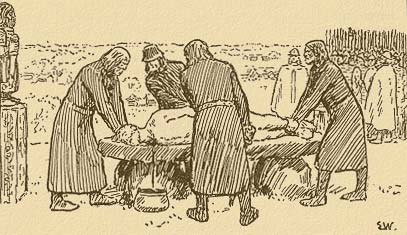The luck of the king is the luck of the land, according to the Ynglings, the most ancient of Viking dynasties. The sad truth of this can be seen in the story of King Visbur and his son Domald — which is appropriate given that today is the winter solstice.
Visbur married the daughter of Aude the Rich. Her name is unknown to history since the value of women was only measured by their ability to give birth to sons. She gave Visbur two sons: Ond and Gisle. At some point Visbur put his wife aside and married another, whose name is also forgotten. The new wife gave him another son, Domald (sometimes called Dómaldi or Dómaldr), who was declared Visbur’s heir.
Ond, Gisle, and their poor nameless mother objected. The two sons went to Visbur to protest, but were rejected. Their mother then cursed Domald with ósgæssa — ill-luck or bad fortune. Ond and Gisle took what today would be called a pro-active approach. This is how the skald Snorri Sturluson described it:
Eptir þat sömnuðu þeir liði, ok kómu at Vísbur um nótt á úvart ok brendu hann inni.
Thereafter they collected men, came unexpectedly in the night on Visbur, and burned him in his house.
The crown passed to Domald, whose curse of ill-luck was compounded by an exaggerated sense of self-worth coupled with a distinct lack of competence. Domald’s reign was disastrous. Crops withered and failed, livestock became sickly and died. So on the winter solstice, at the time of midvinterblot — the annual sacrifice — Domald had his priests sacrifice oxen instead of sheep. The greater the sacrifice, the more it is appreciated by the gods.
It didn’t work. The crops still failed, the livestock grew thinner, old folks and children starved. At the next midvinterblot Domald had his priests sacrifice a few peasants instead of oxen.
It didn’t work. The fields of rye and barley gave paltry yields, the hay and timothy needed to feed the livestock died before it could be harvested, the swine and cattle wasted away. So as the winter solstice and midvinterblot approached:
…a great multitude of Swedes came to Upsalir; and now the chiefs held consultations with each other, and all agreed that the times of scarcity were on account of their king Domald, and they resolved to offer him for good seasons, and to assault and kill him, and sprinkle the stalle of the gods with his blood. And they did so.
And they did so. Snorri Sturluson assures us the crops and livestock then flourished, and all were happy.
Domald dies by bloody arms,
Raised not by foes in war’s alarms
Raised by his Swedish liegemen’s hand,
To bring good seasons to the land.
We shouldn’t read anything into the similarity between the names Domald and Donald. Nor should we consider the blood oblation of midvinterblot as anything other than a metaphor for a meaningful sacrifice. But given recent events, and the promise of more chaos, upheaval, and pandemonium to come, I think it’s past time for Congressional Republicans to begin the ritual necessary to remove our own ill-fated, star-crossed Donald from power.
The luck of king, the Ynglings told us, is the luck of the land. And Comrade Donald is bad luck all around. For the good of the nation and its people, Donald Trump needs to go.



This tale of Domald the Idjit reminds me of the completely shit poem by the completely shit poet Joseph Charles MacKenzie that reads like Burn’s “Address to a Haggis” only less competent and about something horribly less palatable.
http://gothamist.com/2017/01/17/terrible_poem_honors_trump_inaugura.php
Link to the gothamist (the completely shit poem is at the bottom), because fuck driving traffic to MacKenzie’s site.
LikeLike
Whoops! I forgot to mention that MacKenzie’s “poem” sings the praises of our current commander in chief, “Domhnall, the best of MacLeod.”
LikeLike
It’s always a risk. the willful and knowing decision to commit poetry. But damn, that’s a fucking criminal offense, right there.
LikeLiked by 1 person